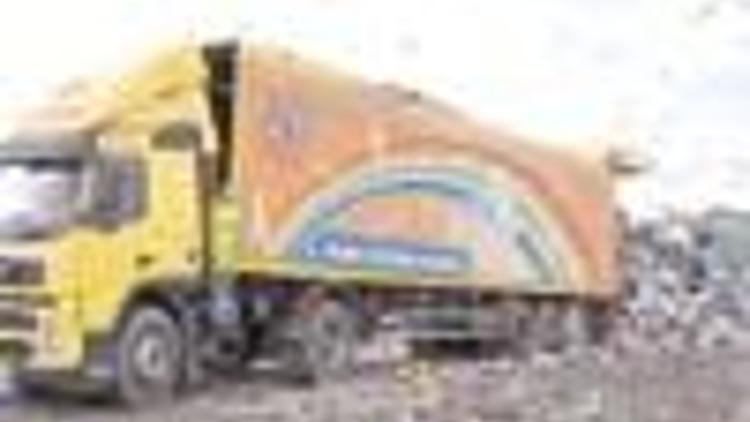Managing Istanbul’s growing waste
Güncelleme Tarihi:

ISTANBUL - In a 2007 report on Turkey’s progress in applying the body of laws required by the European Union of all its members and prospective new members like Turkey, it singles out this country’s progress in instituting new waste management services.
The 2007 report describes the country's waste management services as being the change in which Turkey has advanced the most. The idea of garbage bins and bags however is still a new concept.
One complaint that has been leveled at Istanbul concerns the difficulty of keeping garbage off the streets. It used to be worse, much worse than it is today but it doesn’t stem from laziness or even an "I don’t care" attitude. For centuries in the Ottoman Empire, streets and spaces outside houses were considered the property of the sultan. Just as he was responsible for paving and cleaning the streets so it was the homeowner’s task to keep one’s house spotlessly clean.
Now it is the turn of the local municipality but the mentality hasn’t changed although technically the government is run by the people. The idea of garbage bins is a really new concept and so is the idea of using garbage bags. Even the idea that garbage will be collected at specific times is new and that fines will be applied if those hours aren’t kept.
Actually it takes time for a new idea to get through to the point where people will change their habits to comply. Several years ago the local municipality parked a couple of bins in one open space on a side road that people frequently walked along to go to and from work or shopping. Even the kapicis (janitors) learned to take the garbage to the bin but it took two or three years for everyone to accept it. Then people living near it got an order against leaving garbage there because of the smell so the bins were removed and the street returned to square one.
Where is Turkey?
The year was 1953 when dumping garbage into the sea around Istanbul was finally banned. But you can ban something in Turkey and still find that it’s going on. Even as late as the 1980s, municipalities were dumping garbage into the Bosphorus and if the municipality wasn’t, then seaside restaurants and homes were.
It wasn’t unusual to see everything from dead cows to watermelon rinds come floating by your yali, that can be described as beachfront villas, or boat. Makeshift dumps were set up at a number of locations around the city; however, they were soon overtaken by Istanbul’s population explosion due to migration from the east and southeast of the country. With everything being thrown into these dumps, fires, rodents, bugs, disease and even methane explosions were the results.
The shanty towns grew up near and on these garbage dumps and their inhabitants, children who should have been in school included, sought to earn a few kuruş with anything they might find that could be sold. Well, this continued until a violent methane explosion in Ümraniye in 1993 killed 37 people. Then thoughts turned to better and more proper dumps.
The Istanbul Environmental and Waste Processing Corporation (ISTAC A.S.) was established in 1994 in order to collect waste from the land incorporated within Istanbul. It was also to be responsible for garbage transfer stations, dump sites, composting and recycling facilities and medical garbage collection. There are six sites with most operating below planned capacity and seven transfer facilities. Later the task of foresting the city was added to its duties.
If you ask where Turkey is in the process of protecting the environment, you would have to say that you really don’t know. Every year EU countries throw away 40 million tons of waste or 3.5 tons of waste for every man, woman and child. This does not include 700 million tons of agricultural waste. Between 1990 and 2020, the OECD estimates that the amount of waste to be disposed of will have grown by 65 percent. Although Turkey is a member of the OECD, that organization’s 2008 statistics for waste management in Turkey were last updated in 2005.
Landfill used to dispose of waste three years ago
At that time, the total amount of waste throughout Turkey was over 31 million tons attributable to the country’s municipalities. There are no entries for recycling, incineration with energy recovery and incineration in general while 96 percent was disposed of by landfill.
In 2007 the OECD produced a guidance manual concerning what it defines as a "scheme for ensuring that wastes and scrap materials are managed in a manner that will save natural resources, andprotect human health and the environment against adverse effects that may result from such wastes and materials". The intent of its 11 recommendations is to provide voluntary guidelines to countries that had not yet adopted mandatory rules for the collection of waste.
In 2008, the OECD also started to look into what it calls Sustainable Materials Management. This purports to be an integrated approach that "addresses the management in a cost-effective manner, of materials throughout their life-cycle. It also ensures that the negative impacts from material use and consumption are not relegated to the end of the material’s chain." However this appears to be promising but a long way from being deliverable.
In a 2007 report on Turkey’s progress in applying the acquis (body of laws) required by the European Union of all its members and prospective new members like Turkey it singled out this country’s progress in instituting new waste management services and described them as being the area in which Turkey has advanced the most.

